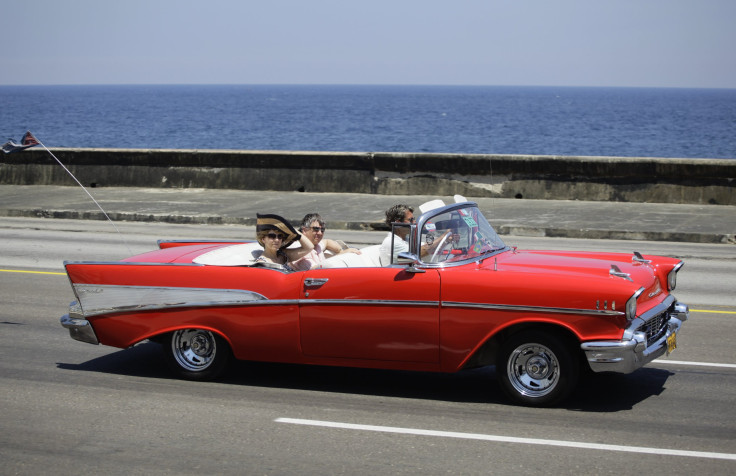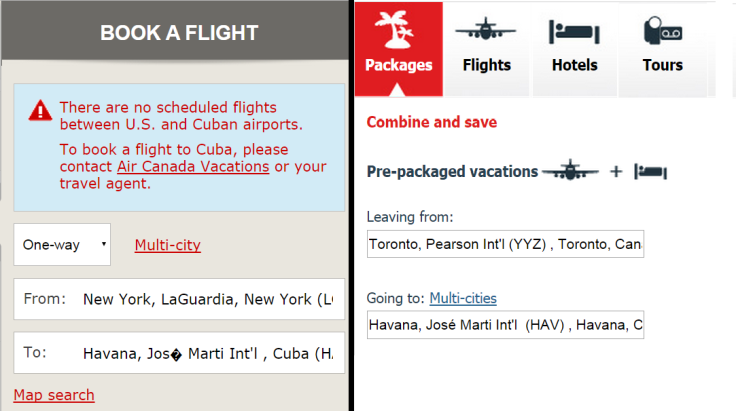How Can Americans Visit Cuba?

As the U.S. works to restore diplomatic ties with Cuba, there’s renewed interest among American tourists to experience the island nation’s rich history, classic cars and minty mojitos — before its authentic flavor gets watered down.
Since President Barack Obama announced Wednesday that the United States would restore economic and diplomatic ties with Cuba after more than 50 years of hostility, “there’s been a flurry of phone calls from people who want to see Cuba as it is right now -- before the Americans invade with McDonald’s and Best Buy and Walmart,” said Jury Krytiuk, senior agent at A Nash Travel agency in Toronto.
Roughly half of Krytiuk’s clients who go to Cuba are U.S. citizens, and that’s not likely to change anytime soon. The White House still hasn’t lifted its travel restrictions for Americans. So, flying directly to Cuba from the U.S. is allowed only if a traveler fits into one of 12 categories that include “humanitarian projects,” “journalistic activity” and “official business of the U.S. government.”
For the time being, there’s no category for “beach vacation.” Americans are allowed to take state-sanctioned “people-to-people” tours, which generally require a strict itinerary, staying in state hotels and a hefty price tag.
But that’s not the only way. For decades, despite the embargo, some Americans have been visiting Cuba by way of indirect flights through countries such as Canada, Mexico and the Bahamas. These trips require less paperwork and can cost less than half the official option. An official, state-approved trip from the U.S. can cost between $4,000 and $5,000 for a week. A package including a resort stay and round-trip flights through Canada or another country will cost about $1,290 (or $1,500 Canadian), according to Krytiuk.
Typically, American travelers book flights to Cuba through a Canadian city or Caribbean hubs such as Nassau, Bahamas, or Cancún, Mexico. From there, every traveler going to Cuba is issued a tourist card for the passport. Upon arrival, Cuban customs agents remove one half of the card, and take the other half upon departure -- leaving no official record of the visit in a traveler’s passport.
“As long as they don’t return with a suitcase full of Cuban cigars or something, they haven’t been getting into trouble,” Krytiuk said.
And his agency isn’t the only one helping Americans visit Cuba. Large-scale vacation providers also help U.S. citizens make the indirect trek.
On the Air Canada booking website, customers who hope to travel from an American city to Cuba will get an initial error message, but are then redirected to another site, with a flight from the closest Canadian airport already filled in. The website for Canadian company Hola Sun, “The Cuba Specialist,” features a section warning customers about using American currencies.

Besides an inefficient flight path, the chance of Americans getting into trouble for going to Cuba is relatively low these days, according to Tom Miller, a general practice attorney based in Oakland, California, who has been working for more than 30 years helping American citizens facing legal battles because of Cuban vacations.
In earlier years, Americans who traveled to Cuba indirectly would receive a letter from the U.S. Office of Foreign Asset Control and risked fines exceeding $10,000. In many cases, he said, he was able to help his clients reduce their fees, but noted that some have been waiting 20 years for a hearing.
“But that was before the last two years,” he said, noting that lately the U.S. government seems to be going after big banks or those importing large amounts of Cuban goods. Miller hasn’t had any Cuba cases in the past year.
“As an attorney I can’t advocate for people breaking the law,” he said. But did say that business has dropped off considerably since Obama took office.
Krytiuk has also noticed that clients are having a much easier time under the Obama administration.
Once they get to Cuba, Americans might pay a 10 percent penalty to exchange U.S. dollars, and can’t use American credit cards, but that’s probably the only difficulty they face.
“The first question that I would get if an American phoned me is, ‘If the Cubans find out that I’m American, are they going to beat me up or something,’ Krytiuk says. “I tell them of course not, they know it’s not you who created the embargo.”
Miller, who travels to Cuba a few times a year under a license for humanitarian and research work, echoed this statement. He said American tourists aren’t treated differently from their Canadian or European counterparts after they arrive.
“Their money is certainly welcome,” he said. “They’re happy to have the tourism.”
© Copyright IBTimes 2025. All rights reserved.






















